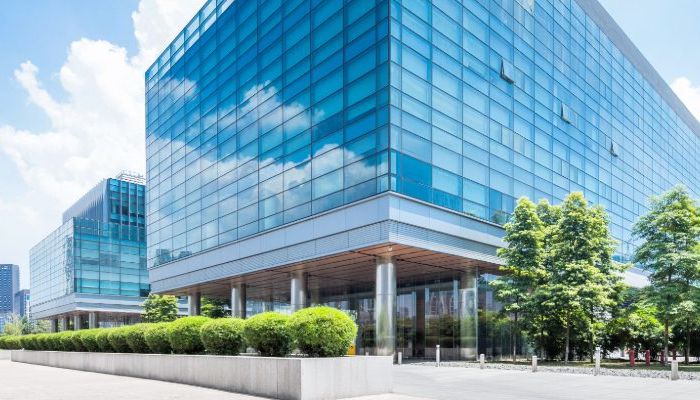The hybrid work model lets employees divide their time between working from home and in the office. This approach has become the new standard for many organizations.
Businesses are adjusting to this change. They are using technology more to create better experiences for both in-office and remote workers.
Artificial Intelligence (AI) is leading this change. It plays an important role in improving hybrid workplace technology.
AI-driven tools are revolutionizing how we collaborate, manage office spaces, and make decisions about workplace design and operations. This blog explores how AI enhances the hybrid work experience. The discussion will also cover what the future may bring for AI in the workplace. We’ll also discuss expert insights into the evolving role of AI in reshaping the hybrid work environment.
Current Applications of AI in the Hybrid Workplace
AI is already making a significant impact on how organizations manage hybrid workspaces. From AI-driven collaboration tools to predictive analytics for workspace management, AI enhances productivity, streamlines operations, and improves employee satisfaction.
1. AI-Driven Collaboration Tools
One of the most immediate and impactful ways AI supports the hybrid workplace is through AI-powered collaboration tools. These tools help improve communication, teamwork, and productivity. They make remote collaboration as effective as working in the office.
Smart scheduling assistants, like Microsoft’s Cortana and Google Assistant, help employees find the best meeting times. They work across time zones and reduce scheduling conflicts. AI-based transcription services, such as Otter.ai, provide real-time meeting transcriptions, helping employees stay focused and reducing the need for note-taking.
AI-driven platforms like Zoom and Microsoft Teams use AI to enhance audio and video quality. They can also remove background noise and suggest meeting agendas. These improvements help remote workers feel as connected as those in the office. This leads to smoother and more productive meetings.
2. Smart Office Solutions
AI-powered smart office solutions are transforming how hybrid workplaces manage their physical environments. These solutions employ AI to monitor, analyze, and enhance the usage of office space. This helps companies make the most of their resources while keeping a comfortable and efficient work environment.
AI-powered occupancy sensors track how many employees are in different parts of the office. They do this at any given time. These sensors help facility managers know when to clean areas, change lighting, or rearrange space based on real usage. AI can also control HVAC systems, optimizing temperature and air quality for employee comfort while reducing energy waste.
Another key aspect of smart offices is AI-driven desk and meeting room booking systems. These systems allow employees to reserve desks or rooms based on real-time availability, ensuring that in-office workers always have access to the resources they need without overcrowding or underutilization.
3. Predictive Analytics for Workspace Management
AI’s ability to analyze vast amounts of data in real time has made predictive analytics a game-changer for workspace management. AI predicts trends in how companies will use office space, allowing them to make informed decisions about their workspace designs, capacity, and resource allocation.
For example, AI-based forecasting tools can predict when peak office attendance is likely to occur, helping organizations manage hybrid schedules more effectively. These tools can also analyze past workspace usage patterns and employee preferences to determine the optimal office layout, ensuring a balance between quiet work areas, collaboration spaces, and meeting rooms.
Companies like IBM have implemented AI-driven predictive analytics to optimize their office layouts and resource allocation. By using AI to anticipate employee needs and adjust workspaces accordingly, businesses can enhance productivity while reducing costs.
Future Trends of AI in the Hybrid Workplace
As AI technology continues to evolve, it is poised to play an even more transformative role in hybrid workplaces. Here are some of the key trends we can expect to see in the coming years.
1. Increased Automation and Workflow Optimization
One of the most exciting trends in AI development is the potential for further automation of routine tasks and processes in the hybrid workplace. AI can take over time-consuming tasks like data entry, meeting scheduling, and even some decision-making processes, freeing up employees to focus on more meaningful work.
For example, AI systems can automate workflows that manage hybrid schedules, ensuring that office capacity never exceeds limits while still allowing employees to choose their work preferences. AI could also manage the allocation of shared resources, like desks and meeting rooms, optimizing space based on real-time needs.
In the future, we may see AI systems that continuously monitor work patterns, using machine learning to adjust hybrid schedules and office layouts on the fly to maximize efficiency and collaboration. By analyzing real-time data from various sources, AI could help companies dynamically adapt to changing workforce needs.
2. Hyper-Personalized Work Environments
As AI continues to evolve, we are likely to see the rise of hyper-personalized work environments, where AI tailors the workspace to each employee’s preferences and needs. Imagine walking into an office where the lighting, temperature, desk height, and even the digital interfaces automatically adjust to your specific preferences.
AI-driven personalization can extend beyond physical comfort. For example, AI could track your work habits and suggest productivity tools, recommend breaks at optimal times, or even adjust your hybrid schedule to match your peak productivity hours. These hyper-personalized environments will help employees work more efficiently, reduce stress, and improve overall well-being.
3. AI-Enhanced Cybersecurity for Hybrid Workplaces
As more companies adopt hybrid work models, the need for robust cybersecurity becomes even more critical. Experts expect AI to play a significant role in protecting hybrid work environments from cyber threats. Organizations already use AI-driven cybersecurity tools to detect anomalies in network traffic, identify phishing attacks, and respond to potential threats in real time.
In the future, AI-enhanced cybersecurity systems could become even more proactive, using predictive analytics to anticipate and block attacks before they happen. AI could monitor employee behavior patterns across both in-office and remote work environments, flagging suspicious activity and reducing the risk of data breaches.
4. AI-Powered Virtual Workspaces
The line between physical and digital workspaces is becoming increasingly blurred, and AI-powered virtual workspaces will be an integral part of this evolution. These virtual environments will enable employees to work, collaborate, and communicate seamlessly, regardless of their physical location.
Imagine a virtual office where employees can “enter” shared digital spaces via virtual reality (VR) or augmented reality (AR) platforms. AI could manage these virtual environments, tailoring them to specific projects or teams. These AI-powered virtual workspaces could replace or supplement traditional offices, offering a more flexible and engaging way for employees to work together.
Expert Opinions on AI’s Future in the Workplace
Many experts believe that AI will continue to play a pivotal role in shaping the future of the hybrid workplace. According to Satya Nadella, CEO of Microsoft, “AI will amplify human ingenuity, creating entirely new ways of working.” Nadella emphasizes that AI won’t replace human workers but will augment their capabilities, making them more productive and efficient in both remote and in-office settings.
Meanwhile, Ginni Rometty, former CEO of IBM, highlights AI’s ability to process and analyze data on a scale that humans simply cannot. “AI is not just about doing things faster; it’s about doing things we couldn’t do before,” says Rometty. This includes optimizing hybrid work models by leveraging AI to create more flexible, personalized, and data-driven work environments.
As more companies adopt AI technologies, experts predict a significant increase in workplace automation, productivity, and overall employee satisfaction. However, they also caution that organizations must invest in training and reskilling employees to work alongside AI systems effectively.
Challenges and Ethical Considerations
While AI presents tremendous opportunities, it also brings challenges, particularly regarding data privacy and ethics. Companies must handle AI-driven surveillance, such as monitoring employee productivity or workspace usage, carefully to avoid infringing on privacy. It is crucial for companies to establish clear guidelines and transparency about how AI collects and uses employee data.
Moreover, as AI becomes more integral to hybrid work environments, companies must ensure that their AI systems are free from bias, particularly when making decisions about promotions, hiring, or workspace allocation.
Conclusion
AI is rapidly transforming hybrid workplace technology, enabling companies to optimize their spaces, automate workflows, and create more personalized and efficient work environments. Current applications such as AI-driven collaboration tools, smart office solutions, and predictive analytics for workspace management are already reshaping how businesses manage hybrid work models.
As AI technology continues to evolve, we can expect even greater advancements in automation, personalization, and cybersecurity, ultimately creating more dynamic and flexible workplaces. However, businesses must also consider the ethical implications of AI and ensure that they use these tools responsibly.
By embracing AI in the hybrid workplace, companies can not only enhance productivity and collaboration but also create environments that better support the diverse needs of their employees.
FAQs
1. How is AI used in the hybrid workplace?
Companies use AI for collaboration tools, smart office solutions, predictive analytics, and automating workflows to improve productivity in hybrid work environments.
2. What are the future trends of AI in workplace management?
Future trends include increased automation, hyper-personalized workspaces, AI-powered virtual environments, and enhanced cybersecurity.
3. How does AI support collaboration in hybrid work models?
AI supports collaboration by improving virtual meeting quality, automating scheduling, and using predictive tools to optimize team communication and resource management.
4. What are the ethical challenges of using AI in the workplace?
Key challenges include ensuring data privacy, avoiding surveillance overreach, and preventing bias in AI-driven decision-making.
5. Can AI help with workplace security in hybrid models?
Yes, AI-enhanced cybersecurity tools can detect anomalies, prevent cyber threats, and safeguard both remote and in-office work environments from potential breaches.










